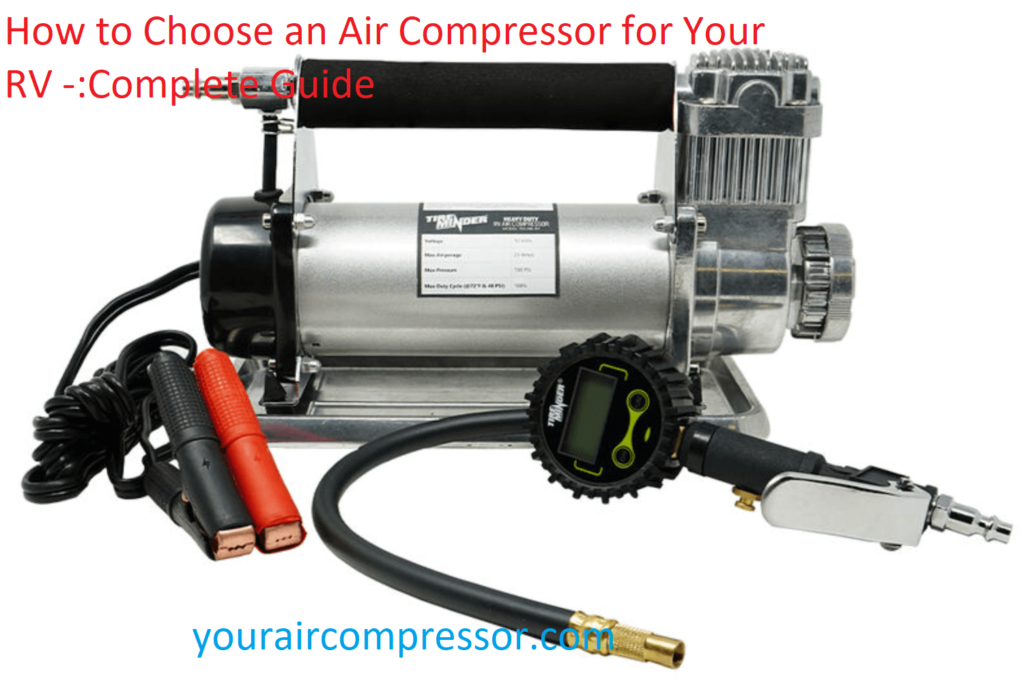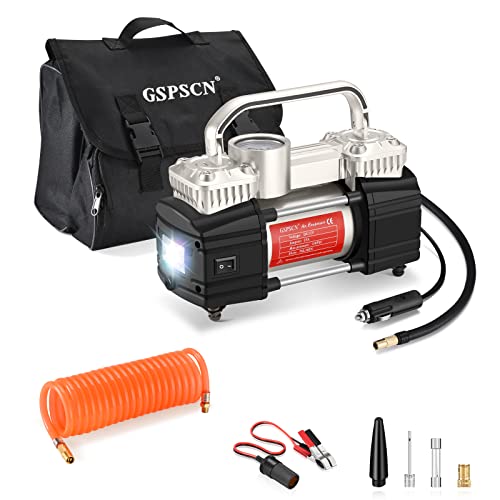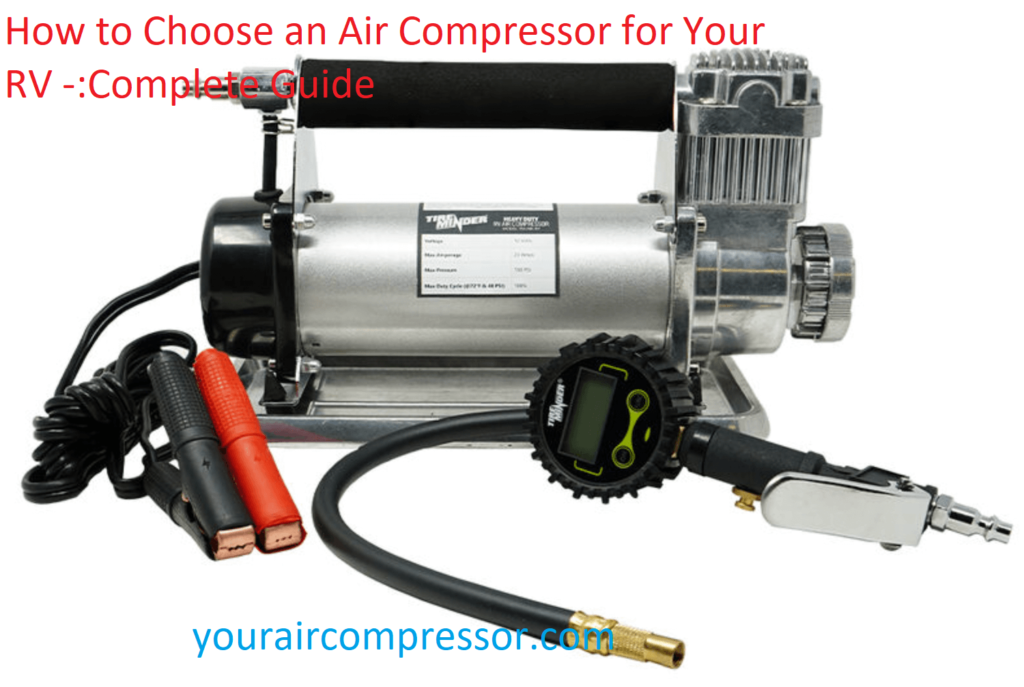 Are you an RV enthusiast looking for the perfect air compressor to get your trips started? With so many options available, selecting the right one can be daunting. You deserve the best and we are here to help make that decision easier.
Are you an RV enthusiast looking for the perfect air compressor to get your trips started? With so many options available, selecting the right one can be daunting. You deserve the best and we are here to help make that decision easier.
From power requirements to features, this guide will make it easy for you to choose an ideal air compressor for your RV.
Choosing an air compressor for your RV can be a daunting task. There are many different types of air compressors on the market, each with its own advantages and disadvantages. It’s important to consider your needs and budget when selecting the right compressor for your RV. This guide will provide an overview of compressors, discuss their various functions and offer some tips on how to make the best decision when it comes to buying one. We’ll also take a look at some of the most popular models so you can easily compare specs and select the right one for you.
Explanation of what an air compressor is
An air compressor is a mechanical device used to increase the pressure of a gas or air. It is commonly used to drive powered tools, such as paint sprayers, nail guns, and air ratchets, for applications such as heavy duty construction. Air compressors are also used in recreational vehicles (RVs) to inflate tires and provide air for other activities.
When selecting an air compressor for your RV, there are several factors that you should consider. You will need to decide on the type of compressor you would like to use as well as the size and power of the compressor. Additionally, you should consider the features that are available with different types of compressors and how they will be useful to you in your travels.
Importance of having an air compressor for an RV
Whether you’re driving a car, an RV, or a lightweight camper, having a reliable air compressor is essential for keeping all the vehicle’s tires properly inflated. An air compressor can also be used to power air guns and other roadside tools, saving time and energy.
Selecting the right type of air compressor for your RV is important for making sure all your needs are met on the road.
When choosing an air compressor for your RV, there are a few factors to consider: size, power, heat output and noise level. You’ll want to make sure that the compressor you choose is powerful enough to adequately handle the job at hand but not so powerful it creates excess noise or heat while in operation. The size of the unit should also accommodate any additional tools or accessories you may need while on the road. Additionally, you’ll want to confirm warranty information prior to purchase in case any issues arise down the line.
Maintenance and Care of Your Air Compressor
Once you’ve chosen the air compressor that will best suit your needs and installed it in your RV, ensuring proper care and maintenance is key to maintaining safe use and optimal performance. Below are a few tips to help you maintain and keep your air compressor in top shape:
- Change oil every 30 North American operated hours or every three months, whichever comes first.
- Check fluid levels regularly, as low levels can cause damage to the engine.
- Store air compressor at the lowest temperature possible if it won’t be used for extended periods of time. This minimizes oil toxicity and component damage from excessive heat expansion.
- Avoid running the compressor at high speed for extended periods of time as this can overheat and cause component damage. Allow for short cooling breaks every 15 minutes of operation.
- Drain water from your tank on a regular basis to reduce corrosion and oxidation, or use an automatic drain system to ensure moisture is regularly removed from the tank.
- Regularly check hoses and fittings for signs of wear or any leaks that need to be repaired with water-tight sealants or replacements parts before use.
Regular cleaning
A regular cleaning of your air compressor is an important part of care and maintenance. To keep it running smoothly and efficiently, you should clean or replace the filter or strainer, as well as inspect the various seals and gaskets for any leaks. It is also a good practice to check the oil level regularly and replace it when necessary. Failure to properly maintain a compressor can result in decreased efficiency and ultimately premature failure of the unit.
If you are using your RV air compressor regularly, it is best to thoroughly clean it once a month using compressed air, soapy water, and a brush or cloth. Ensure that all drain plugs are open before washing so that any debris can be washed away from the unit entirely. Allow the unit several hours to dry completely before beginning use, replacing unique fluid loss upon completion of cleaning.
Proper storage

When it comes to storage, there are some important things that you need to keep in mind in order to make sure your air compressor works as intended for years to come.
Make sure that you store your air compressor in a dry place and away from heat sources. It is also recommended that you store your air compressor vertically as this will help prolong its life.
Another thing to keep in mind is that you should always make sure that the oil level of the unit is at the proper level before storing it.
If your RV’s power source is switched off while it is stored, always disconnect the power source from the unit and turn off all switches before storing it.
Lastly, avoid leaving stored items on top of the compressor while inside your RV.
Factors to Consider When Choosing an Air Compressor for Your RV
When considering an air compressor for your RV, it’s important to consider factors other than size and power. Here are some additional things to think about:
- Noise: The amount of noise that the air compressor will produce is an important factor, especially if you plan on using your RV in areas that are known for their tranquility. Consider manufacturers that create compressors that are quieter or feature built-in soundproofing options to ensure the noise level is kept low.
- Power source: There are different power sources available, including fuel-powered, electric-powered, or portable (battery) powered models. If you don’t have access to a power source at your camping spot, you may want to consider a portable option so you can keep it charged up while traveling and never have to worry about running out of air pressure when you need it most.
- Portability: Another key factor is portability; specific for RVers this often means the availability of stored space within the vehicle itself in which an air compressor can be placed when not in use – making sure it fits within the existing seating arrangements without compromising too much space and still be immediately accessible when required during basic maintenance tasks such as inflating tires etc.,
- Pressure capacity: This can be adjusted depending on what type of jobs you plan on using the air compressor for (e.g inflation etc.) and make sure it accurately meets your expectations based on what jobs will be regularly carried out in its required lifespan’s usage rate.
Tank size
When choosing the right air compressor for your RV, one of the most important aspects to consider is the size of the tank. In general, you should go for an air compressor with a larger tank if you want to be able to inflate and deflate different elements quickly. Larger tanks can hold more air and, therefore, are able to fill up more quickly than smaller tanks.
However, if space is a major concern in your RV setup, then a smaller tank might be preferable as it will take up less room in your vehicle. Additionally, some compressors come with dual-tank system options that provide added functionality for times when inflation speed is at a premium.
CFM (Cubic Feet per Minute) rating
Cubic feet per minute (CFM) is an important measurement when it comes to air compressors, as it determines how powerful the unit is and the rate at which it can fill the tire with air. The higher a compressor’s CFM rating, the faster and more powerful it will be. Depending on how quickly you need access to compressed air, you’ll want to look for an RV air compressor with a higher CFM rating in order to handle demanding tasks like inflating tires or running other tools such as sanders or grinders.
Additionally, since some vehicles may be equipped with larger tires that require more air pressure than others, it’s important to make sure that your compressor’s CFM rating is high enough to cope with this increased demand. It’s also worth keeping in mind that many towed trailers are often heavier than their tow vehicle and so may require more CFM rating from a single unit in order for them to be filled quickly and efficiently.
Power source
Power source is an important factor to consider when selecting an air compressor for your RV. There are three power sources from which to choose: electric, gas-powered or manually powered.
Electric air compressors are either 12-volt, 110-volt/120-volt plug-in models or a combination of both. Smaller electric air compressors are great for bike tires and other small tasks. Larger electric models will be necessary for bigger jobs like inflating RV tires while camping on sites without hookups, as they cannot be plugged into the grid.
Gas-powered compressors are more powerful than their electric counterparts and provide more volume with fewer strokes, but have the disadvantage of being noisy and requiring gasoline which can make them less practical for use within an RV setting.
Manual air pumps often require more effort to use; however they allow you to inflate things anywhere — even off the grid.
Conclusion

In conclusion, selecting the right air compressor for your RV should be done with a lot of thought. Whereas every RV owner needs to have an air compressor, getting one that can properly meet their needs is an important consideration. An inadequate air compressor will definitely lead to frequent breakdown and repairings, which can be inconvenient and expensive in the long run. A bigger but quality and well-maintained air compressor is often advisable in the long-term given its effective performance and durability.
Additionally, following the local regulations on using air compressors while using roads is mandatory as penalties may apply otherwise. Therefore, be sure to abide by these codes when selecting an ideal Compressor for your RV before you go out on the road with your recreational vehicle.
FAQ
What size air compressor do I need for RV?
The size of the air compressor you need for your RV depends on your specific needs, including the size of your RV tires and the type of air tools you plan to use.
How do I know what size air compressor I need?
You can determine the size of air compressor you need by considering the required CFM (cubic feet per minute) for your tools and the recommended PSI (pounds per square inch) for your RV tires.
What is the best air compressor for an RV?
The best air compressor for an RV depends on your specific needs, but some popular options include the Viair 400P, the ARB CKMA12, and the Smittybilt 2781.
How do I choose the right type of air compressor?
To choose the right type of air compressor, consider the size and weight of the compressor, the type of power source (electric or gas), and the type of tools you plan to use.
How many CFM air compressor do I need?
The required CFM for your air compressor depends on the type of tools you plan to use. Consult the tool manufacturer or user manual for the recommended CFM.
How long can a 12V air compressor run?
The runtime of a 12V air compressor depends on the specific model and the conditions under which it is used. Consult the user manual or manufacturer for information on runtime.
Is a 30 gallon air compressor big enough?
The size of air compressor you need depends on your specific needs. A 30-gallon air compressor may be sufficient for some applications, but larger compressors may be necessary for others.
What should I look for in a 12V air compressor?
When choosing a 12V air compressor, consider the required PSI and CFM, the duty cycle, the weight and size of the compressor, and any additional features such as automatic shutoff or built-in pressure gauge.
Is 50l air compressor enough?
The required size of air compressor depends on your specific needs. A 50-liter air compressor may be sufficient for some applications, but larger compressors may be necessary for others.
Is higher CFM better air compressor?
A higher CFM (cubic feet per minute) rating generally means that the air compressor can deliver more air to power air tools or inflate tires more quickly. However, the required CFM depends on the specific application and tools being used.
see also…
- Best harbor freight air compressor 2023
- Best quiet air compressor 2023
- Best portable jump starter with air compressor 2023
- Best Portable Air Compressor For Truck Tires 2023
- Best Pipe for Air Compressor Lines 2023

